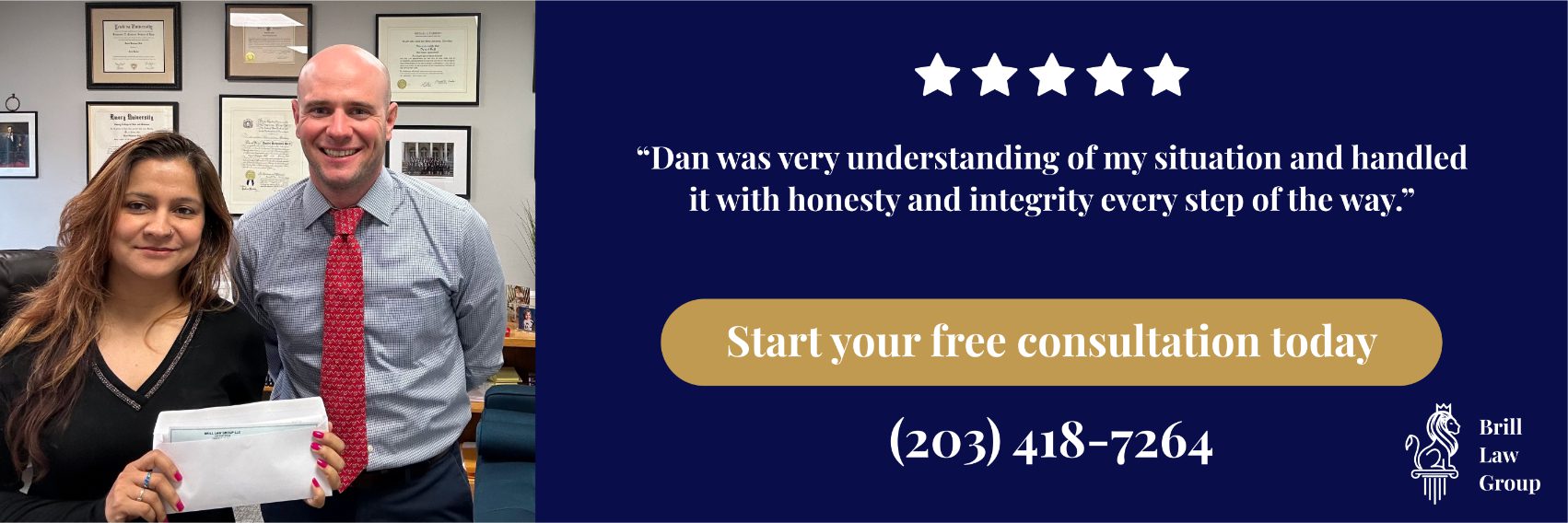Fairfield Common Car Accidents
On This Page
- Common Causes of Fairfield Car Accidents
- Distracted Driving in Fairfield
- Speeding on Fairfield Roads
- Drunk Driving Accidents in Fairfield, CT
- Dangerous Intersections in Fairfield, CT
- Weather-Related Car Crashes
- Tailgating and Aggressive Driving in Fairfield
- Dangers of Following Too Closely
- Road Rage Consequences
- Vehicle Maintenance Issues
- Drowsy Driving Incidents
Car accidents in Fairfield, CT are scary, frustrating, and stressful. Unfortunately, though, they do occur frequently, and for a variety of reasons. Here at the Brill Law Group, we are here to ease your frustrations, and offer you our legal guidance. Our team of car accident lawyers are here to provide you with support, answers to your questions, and earn you the compensation you deserve. We understand how you may be feeling, so as a team, we look to maximize your satisfaction and compensation, while minimizing your stress and frustration.
Common Causes of Fairfield Car Accidents
Car accidents are dangerous, and often result in injury. If you are in need of a personal injury lawyer, look no further, as the Brill Law Group is here and ready to take on your case. No fees unless we win!
Distracted Driving in Fairfield
Glancing at your phone, adjusting the radio, or reaching for a snack – these seemingly harmless actions can lead to distracted driving, one of the most common causes of car accidents in Fairfield. When you take your eyes off the road, even for a moment, you greatly increase your risk of being involved in a collision.
Distracted driving awareness is extremely important for preventing these accidents. Consider the following types of distractions:
- Visual: Taking your eyes off the road
- Manual: Removing your hands from the wheel
- Cognitive: Letting your mind wander from the task of driving
Mobile phone distractions are particularly dangerous, as they often involve all three types of distraction simultaneously. To avoid the temptation of using your phone while driving, we recommend putting your phone away while driving, and setting your GPS before starting your journey. Remember, no message or distraction is worth risking your life or the lives of others on the road.
Speeding on Fairfield Roads
Speeding is another major contributor to car accidents in Fairfield, often even more dangerous than distracted driving. When drivers exceed posted speed limits, they reduce their reaction time and increase the severity of potential collisions. This reckless behavior puts everyone on the road at risk.
Fairfield’s road safety depends on drivers adhering to speed limits, which are set based on:
- Road conditions
- Traffic patterns
- Surrounding environment (residential areas, school zones, etc.)
Exceeding these limits greatly increases the likelihood of:
- Loss of vehicle control
- Reduced ability to navigate curves or obstacles
- Extended stopping distances
- More severe injuries in the event of a crash
Drunk Driving Accidents in Fairfield, CT
Drunk driving remains one of the most dangerous causes of car accidents. When you consume alcohol, your ability to drive safely is greatly impaired, affecting your judgment, reaction time, and coordination. Not only does drunk driving put lives at risk, but it also carries severe legal consequences, including fines, license suspension, and potential jail time.
Alcohol Impairs Driving Ability
Impaired judgment is particularly dangerous, as it leads to risky behaviors like speeding or failing to yield. Even small amounts of alcohol can affect your driving skills. At a blood alcohol concentration (BAC) of just 0.02%, you may experience:
- Altered mood
- Decreased visual functions
- Reduced ability to multitask
As your BAC increases, these impairments worsen. At the legal limit of 0.08%, your muscle coordination, reaction time, and judgment are severely compromised. It’s essential to understand that “buzzed driving” is still drunk driving.
Legal Consequences of Driving Under the Influence
The legal consequences of drunk driving accidents extend far beyond the immediate crash. If you’re involved in a DUI incident in Fairfield, you’ll face severe penalties that can impact your life for years to come. Legal penalties for DUI in Fairfield may include:
- Hefty fines, often thousands of dollars
- License suspension or revocation
- Mandatory alcohol education programs
- Installation of an ignition interlock device
- Possible jail time, especially for repeat offenders
Additionally, you may face:
- Increased insurance rates
- Criminal record affecting job prospects
- Civil lawsuits from injured parties
Preventing Drunk Driving
Preventing drunk driving accidents is essential for everyone’s safety on the road. As one of the common causes of Fairfield car accidents, drunk driving poses a significant threat to our community. By raising awareness and taking proactive steps, we can work together to reduce the number of alcohol-related collisions.
To prevent drunk driving, consider these important strategies:
- Designate a sober driver before going out
- Use ride-sharing services or public transportation when drinking
- Never let friends drive under the influence
- Host responsible parties by offering non-alcoholic options and arranging safe rides home
Community awareness plays an important role in preventing drunk driving accidents. Local organizations and law enforcement agencies often collaborate to educate the public about the dangers of impaired driving. These initiatives may include sobriety checkpoints, public service announcements, and school programs aimed at young drivers.
Drunk Driving is a serious issue, with dangerous effects for yourself and others. Check out this guide about driving under the influence in the state of Connecticut to make sure you understand the consequences at stake.
Dangerous Intersections in Fairfield, CT
Have you ever approached a chaotic intersection full of confusion and fear? Dangerous intersections are among the common causes of car accidents in Fairfield, often due to poor design, inadequate traffic signals, or driver confusion. These hazardous spots can greatly increase the risk of collisions, especially during peak traffic hours or adverse weather conditions.
To reduce your chances of being involved in an accident at dangerous intersections:
- Always approach with caution, even if you have the right of way
- Be prepared to stop suddenly if necessary
- Watch for drivers who may run red lights or stop signs
- Pay attention to pedestrians and cyclists who might cross unexpectedly
Weather-Related Car Crashes
Living in New England, we are often subjected to a variety of weather conditions. Sometimes these conditions can impact our roads, and the abilities of drivers. To minimize your risk of weather-related car crashes, consider these safety tips:
- Maintain proper tire tread and pressure for peak traction
- Increase your following distance to allow for longer stopping times
- Use headlights to improve visibility, even during daytime precipitation.
- Reduce your speed to match road conditions, regardless of posted limits
Understanding how weather affects your vehicle’s performance is essential for safe driving. Rain, snow, ice, and fog can all reduce visibility and traction, making it harder to control your car. In these conditions, it’s important to adjust your driving habits accordingly.
Tailgating and Aggressive Driving in Fairfield
Tailgating and aggressive driving are major causes of car accidents that you should be aware of. When you follow too closely behind another vehicle, you greatly increase the risk of a rear-end collision, especially if the driver in front needs to brake suddenly. Aggressive behaviors like speeding, weaving through traffic, and road rage not only endanger you, but also put other drivers at risk, potentially leading to serious accidents and legal consequences.
Dangers of Following Too Closely
Impatience on the road can lead to one of the most common causes of car accidents: following too closely. This dangerous practice, known as tailgating, greatly increases the risk of rear-end collisions and multi-vehicle pileups. When drivers fail to maintain a safe following distance, they reduce their reaction time and ability to respond to sudden changes in traffic conditions.
To learn more about tailgating, and following too closely, the Brill Law Group offers a further guide about what to do after being in a tailgating accident.
Road Rage Consequences
Road rage is one of the common causes of car accidents that can lead to serious injuries and legal repercussions. When drivers let their emotions take control, they often engage in dangerous behaviors that put everyone on the road at risk.
Road rage statistics show that aggressive driving incidents are on the rise, with consequences ranging from minor collisions to fatal accidents. Some common examples of road rage include:
- Tailgating
- Excessive honking
- Cutting off other drivers
- Making rude gestures
- Verbal threats or physical confrontations
Managing emotions while driving is vital to prevent road rage-induced accidents. If you find yourself becoming angry behind the wheel:
- Take deep breaths to calm down
- Avoid eye contact with aggressive drivers
- Give yourself extra time to reach your destination
- Use calming music or podcasts to reduce stress
Vehicle Maintenance Issues
Among the common causes of car accidents, vehicle maintenance issues play a significant role. Neglecting your vehicle’s upkeep can lead to serious safety hazards on Fairfield roads. Regular vehicle inspections are essential to identify potential problems before they result in mechanical failures.
Common maintenance issues that contribute to accidents include:
- Worn brake pads or rotors
- Bald or underinflated tires
- Faulty steering components
- Malfunctioning lights or signals
- Engine problems
When these issues are left unaddressed, they can cause unexpected breakdowns or loss of vehicle control, potentially leading to accidents. It’s your responsibility as a driver to ensure your vehicle is in proper working condition.
Drowsy Driving Incidents
Drowsy driving incidents are another common cause of car accidents that often go unreported. Sleep deprivation can greatly impair a driver’s ability to operate a vehicle safely, leading to potentially dangerous situations on Fairfield roads. Drowsy driving can be as dangerous as drunk driving, affecting:
- Reaction time
- Decision-making abilities
- Alertness
- Concentration
Many drivers underestimate the impact of fatigue on their driving performance. Long work hours, irregular sleep patterns, and certain medications can contribute to drowsiness behind the wheel.



